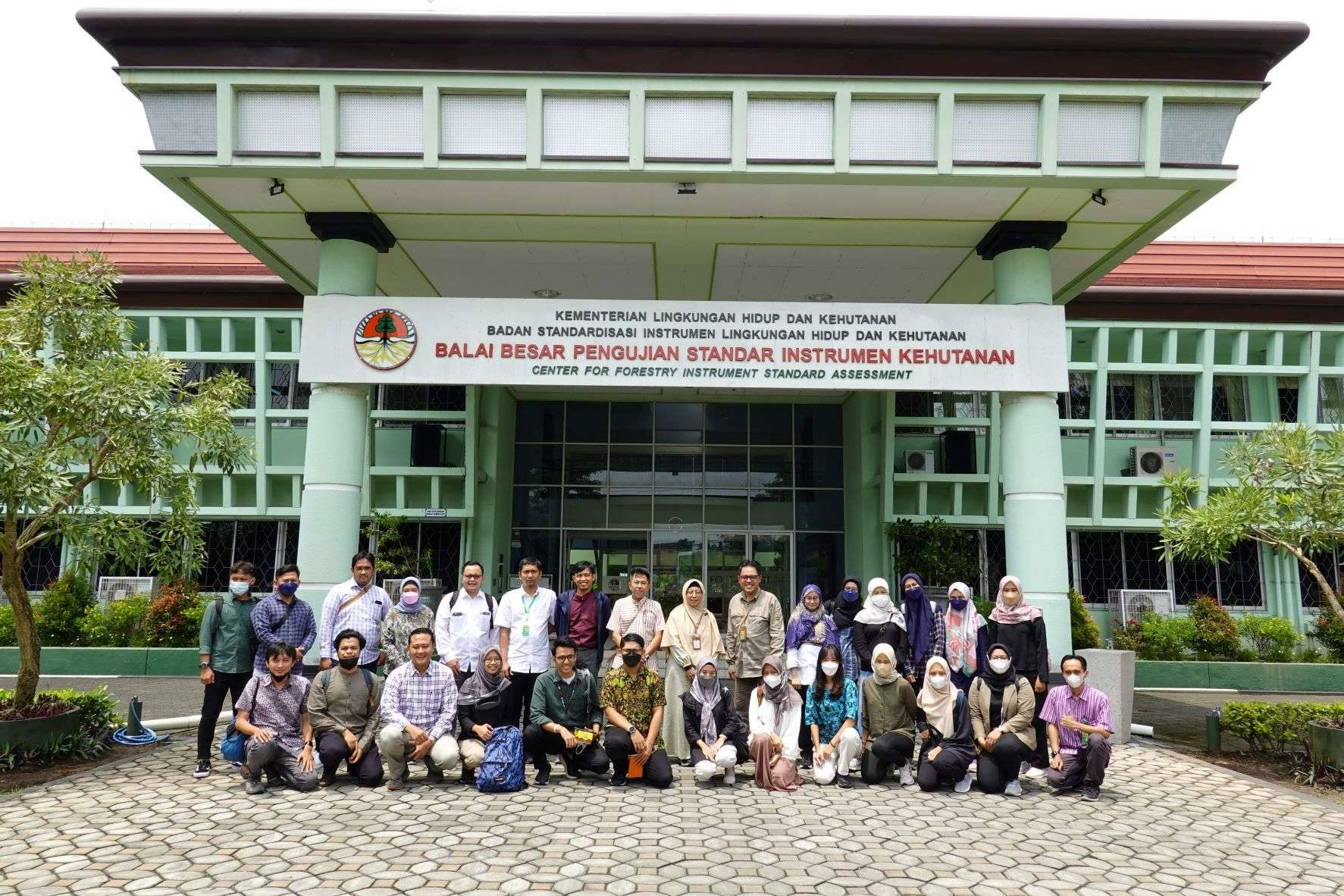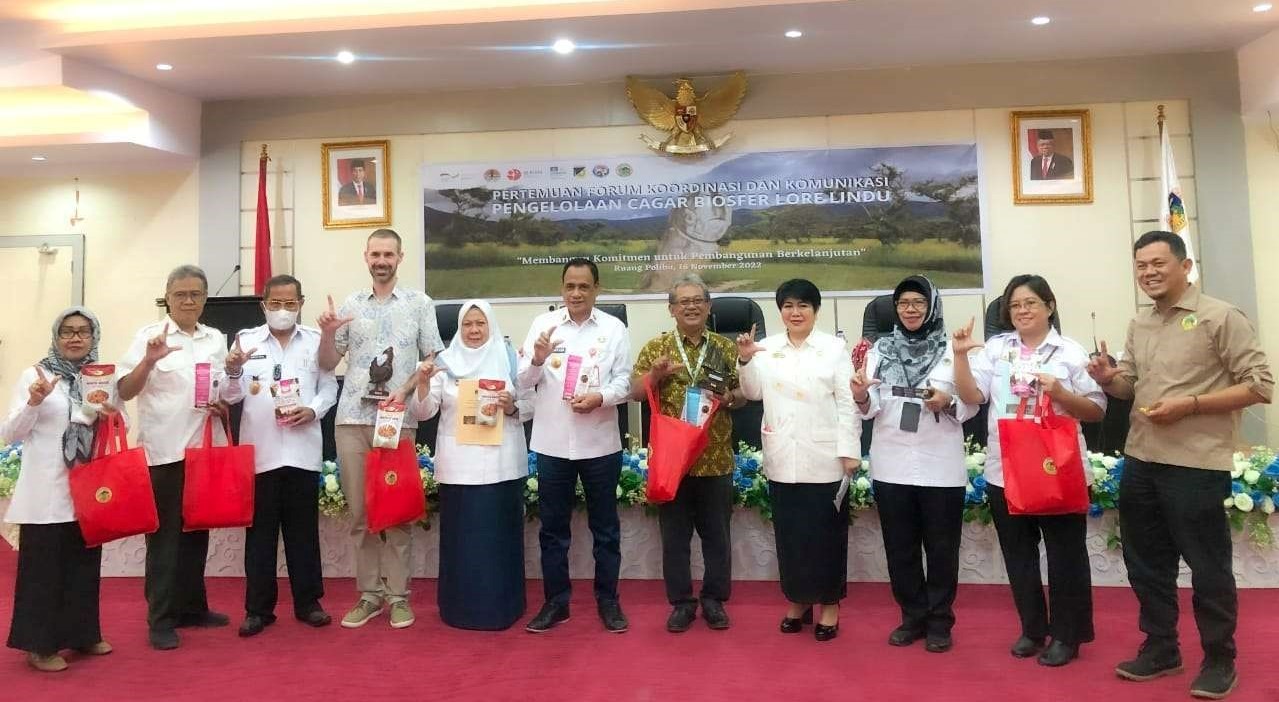FORCLIME
Forests and Climate Change ProgrammeTechnical Cooperation (TC Module)

Select your language

Continuing with the series of FGDs on the development of national forest bioeconomy policies in Indonesia, FORCLIME, supported by Bappenas, held a recent FGD that addressed the potential of the forest product processing industry and the role of Access and Benefit Sharing (ABS) in supporting forest bioeconomy development in Indonesia. This FGD was held on 18 November 2022 in Yogyakarta and was also conducted online.
The meeting was opened by Mrs. Dr. Nur Hygiawati Rahayu, ST, MSc, Director of Forestry and Water Resources Conservation at the Ministry of National Development Planning/Bappenas, and was divided into two sessions. During the first session, the FGD focused on the potential development of forest products to support the bioeconomy. The first resource person taking part in this session was Mrs. Aida Greenbury of the World Bioeconomy Forum. Mrs. Greenbury offered an overview of current issues relating to international bioeconomy forums, as well as examples of existing bioeconomy development strategies that are being pursued in other countries. Some of the enabling conditions required to support bioeconomy development include the availability of bio-databases, regulation of the roles and responsibilities of key ministries, investment research and analysis, demand formation and market ecosystems, and international cooperation.
The next resource person to offer insights into this area was Mrs. Merrijantij Punguan Pintaria, ST, M.Eng, who is the Director of the Forest and Plantation Products Industry at the Ministry of Industry. Mrs. Merrijanti provided information on the profile and performance of the forest and plantation product industry and the economic conditions of global manufacturing, as well as policies in Indonesia that have the potential to support the development of the bioeconomy industry. Coordination of the upstream/downstream industry with the Investment Coordinating Board/Badan Koordinasi Penanaman Modal (BKPM) also represents an important form of capital capable of encouraging investment in accordance with domestic requirements and as a part of efforts aimed at increasing the strength of the upstream sector, including the forestry sector.
During the second session, the discussion focused on the concept and role of ABS in supporting bioeconomy development. The resource persons for this session were Mr. Hartmut Meyer and Mr. Olivier Rukundo from GIZ and Mr. Rik Kutsch Lojenga from the Union for Ethical Biotrade. These two experts explained that ABS could offer legal certainty to owners of genetic resources and researchers, as well as encourage product development and guarantee fair profits for the parties involved. ABS implementation requires a clear policy framework and strong coordination between relevant ministries and government agencies. There are a number of best practices for the implementation of ABS that provide benefits for a country, however, in some countries, ABS actually hinders the development of research into genetic resources. Therefore, a thorough analysis of the existing legal frameworks must be carried out to avoid any duplication or conflict with existing regulations.
For more information, please contact:
Nurdita Rahmadani, Junior Advisor for Monitoring, Evaluation and Reporting
R. Rizka Dewi Zuleika, Junior Advisor for Sustainable Forest Management
Pipin Permadi, Senior Advisor and Liaison Officer
Wandojo Siswanto, Strategic Area Manager for Forest Policy and Climate Change

As part of a study on the development of national forest bioeconomy policies in Indonesia, FORCLIME, supported by Bappenas, recently visited the laboratory of the Center for Testing Standards for Forestry Instruments (BBPSIK) Yogyakarta and the laboratory of the Faculty of Forestry, Gadjah Mada University (Fahutan UGM). This visit was undertaken in an effort to seek information on the latest developments in bio-based products and the views of researchers/academics on the potential for bioeconomy development in Indonesia. Led by Mrs. Dr. Nur Hygiawati Rahayu, ST, MSc as Director of Forestry and Water Resources Conservation at the Ministry of National Development Planning/Bappenas, the visit was held on 17 November 2022.
At BBPSIK Yogyakarta, Bappenas and FORCLIME teams were received by the Head of BBPSIK Yogyakarta, Mr. Dwi Prabowo Yuga Suseno, S.Sc., M.Sc., PhD. In his remarks, Mr. Dwi Prabowo offered a glimpse into the role of BBPSIK Yogyakarta in the wake of the issuance of the Job Creation Law, as well as the various facilities that are owned and operated by BBPSIK Yogyakarta, which include laboratories and Special Purpose Forest Areas. Mr. Prabowo’s remarks also addressed bioenergy development activities involving nyamplung plants (Calophyllum inophyllum). The development of nyamplung plants at BBPSIK Yogyakarta first got underway in 2008 and the initial focus of this development was upstream improvement through the selection of superior stems and then multiplying them to obtain plants characterized by high levels of productivity. Currently, this development is being successfully continued and is working on the extraction and manufacture of biodiesel. In this regard, biodiesel derivatives can be used as sources of bioenergy and biopharmaceuticals. Biodiesel processing waste can also be used to make briquettes, liquid smoke, feed and cosmetics.
After the discussion, the team was taken to visit the Oil Producing NTFPs Testing Laboratory to observe the process of extracting vegetable oil through the application of various methods, as well as differences in the quality of the oil based on species and processing process. The team also visited the Tissue Culture Test Laboratory to observe the tissue culture techniques that are being used on several plants such as nyamplung, sandalwood, eucalyptus and sengon.
The team then moved to Fahutan UGM, where it was welcomed by the Dean of Fahutan UGM, Mr. Sigit Sunarta, S.Hut., MP, M.Sc., Ph.D, and a selection of lecturers. Discussions with academics at UGM focused on views and opinions relating to opportunities and challenges for the future development of the forestry bioeconomy. One of the important points discussed was the need to analyze market opportunities and synchronize upstream and downstream forest products to ensure that the carrying capacity of the allocated land has the right benefits and avoids land degradation problems.
For more information, please contact:
Nurdita Rahmadani, Junior Advisor for Monitoring, Evaluation and Reporting
R. Rizka Dewi Zuleika, Junior Advisor for Sustainable Forest Management
Pipin Permadi, Senior Advisor and Liaison Officer

In order to prepare for a periodic review of the Lore Lindu Biosphere Reserve (LLBR) that will be conducted in 2023, the LLBR Management Coordination and Communication Forum, led by the Regional Planning and Development Agency (Bappeda) of Central Sulawesi Province, recently held its 2022 LLBR Management Coordination and Communication Forum Meeting. The theme of this year's annual meeting was, “Building Commitment for Sustainable Development” and the event was held on 16 November 2022 at the Polibu Meeting Hall in the Governor’s Office of Central Sulawesi Province.
The meeting was opened by Drs. H. Ma'mun Amir, Deputy Governor of Central Sulawesi Province, who stated his appreciation for the efforts of Bappeda, related stakeholders and development partners regarding the implementation of the meeting. Mr. Amir also expressed his hope that the involvement of all parties would result in the integration of different aspects relating to planning and implementation, ultimately resulting in sustainable development and an ability to meet the needs of the present generation without compromising the ability of future generations to meet their needs sufficiently.
During the meeting, a panel discussion was held and involved contributions from two invited speakers, namely Prof. Dr. Ir. Y. Purwanto, DEA (Chairman of the Indonesian MAB National Committee and the National Research and Innovation Agency), who offered insights into the management of biosphere reserves, the preparation of periodic reviews and product branding, as well as Mr. Christopher Eichhorn (GIZ FORCLIME Jakarta), who shared his experiences of the management of biosphere reserves in Germany. A video message from Dr. Hans Decker Thulstrup (MAB UNESCO Headquarters in Paris) was also shown.
After the meeting had been concluded, a Memorandum of Understanding was signed and represented a joint commitment by district/city governments in the LLBR area (including the governments of Palu City, Poso Regency, Parigi Moutong Regency, Donggala Regency and Sigi Regency) to make a positive contribution towards sustainable LLBR management. Biosphere Reserve Product Certificates were also handed over to nine SMEs that have been verified by the LLBR Product Registration and Verification Team. The SME products in question included chocolate, crispy brownies, chocolate bagea, fried onions and coffee.
As a follow-up to this meeting, an LLBR master plan will be developed while a periodic review form will be completed.
For more information, please contact:
Fikty Aprilinayati, Advisor for Sustainable Forest Management and Biosphere Reserve Management
Ismet Khaeruddin, Senior Adviser for Biodiversity Focal Point for the KFW Forest Program 3 and Provincial Coordinator for Central Sulawesi


